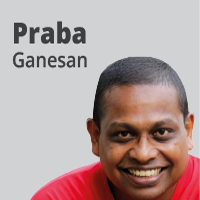A quibble over any Basha or Merican

How special is a Bumiputera in a Malaysia with 80 plus per cent falling inside that category?
Praba Ganesan, The Malay Mail Online
Shahul Hameed picked me up at the intersection of Changkat Bukit Bintang and Gang Sahabat 1, two nights ago.
Minutes into the Uber ride, I asked if he was Tamil. He was. He’s also from Ampang Tasik and drives part time though he rarely gets to Cheras, where he eventually dropped me off.
Unsurprisingly, our conversation was in Tamil.
Yesterday, at my local barber’s there was the usual chatter about a house to be sold in Seremban. Somehow the owner died under a tree.
Jamal, he always wears an Indian style songkok, was adamant that such a death was auspicious; he was engaging to listen to since he spoke in flowing Tamil. I have to read up on cold bodies and branches.
Both Jamal and Shahul Hameed are variants of an intractable contradiction of being Muslim and Indian in Malaysia, and how it plays into the Bumiputera discourse.
It’s the trending topic this week and after this cycle ends, it will rear its ugly head again seasonally, due to its toxic nature. The story of Indian Muslims is the story of Malaysia, in many ways.
A coterie of wild emotions
For Shahul Hameed is from Ampang, speaks in Tamil when encouraged to, and works in a non-traditional industry.
Jamal, on the other hand, is from India — Tamil Nadu to be specific — and resides in Cheras, working in a quintessential Indian business.
The matter is murkier as a legion of Malaysians have degrees of Indian blood — overwhelmingly Tamil — and a considerable number with Indian oriented names who tend to be defensive and equally proud about them depending on the context.
Indian oriented Muslim names?
Look at the spelling. Rasheed not Rashid. Reezal not Rizal. And Mydin is completely self-explanatory.
While Mahathir Mohamad had problems explaining his roots to foreign interviewers, he’d be proud to have grandchildren with only one-eighth Indian ancestry, after he did his bit to marry into one of Kuala Lumpur’s more prominent Malay families. He’s the example of running from the past.
Then there are those — Malay, far beyond just Constitutional technicalities — priding in having no Tamil language skills but a sense of superiority associated with being more than just Malay.
It’s hard to translate, probably much of it is imaginary but it does render a discussion about which Indian who is Muslim has to be accorded what type of identity.
Couple the above with the single entries. Those from non-Muslim families converting for personal reasons and meet accelerated acceptance. Cue, Umno lawyer Shafee Abdullah and Umno elected leader DJ Dave.
Wrap the head around it and a headache is induced.
The arbitrary nature of the path to Bumiputera, and the irreversible nature of the conclusion, renders it impossible to dissect with honesty.
Indian, Muslim and Malaysia converge in curious ways. A blanket treatment is probably elusive.
Privilege
The US Office of Management and Budget allows in census-taking for someone with Mexican lineage to identify himself or herself as Mexican, or Hispanic/Latino or of Spanish origin.
Latino extends to Mexicans, Cubans, Puerto Ricans and other Central American countries’ extraction.
One can choose to be any one of the three, and not the state for them.
Because identity is personal and persons should have the right to be seen by others as they see themselves.
In Malaysia, identity offers access and opportunities.
The Indian Muslim groups are not requesting for reclassification because they long to be officially Bumiputera, but what that assignation provides.
A single line can lead to spots in exclusive boarding schools or a spot in the race for scholarships to Brown or London School of Economics.
This is far less a debate about identity as it is about access.
Which is why the petitioners appear disingenuous.

